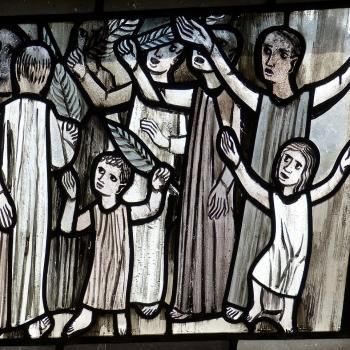In an interview with CNN a few years ago, Barbara Brown Taylor said something that sounded familiar to me.
“True believers are among the meanest people I’ve ever met,” she says, stretching out her legs in a cozy living room filled with books on poetry, religious icons and a photo of her posing with Oprah. “I cannot think of anybody of another faith who has wounded me like Christians,” she says. “Judged, condemned to hell, cast out of the body of the faithful — look me up online.”
In my own small way, I know exactly what she is talking about. To my knowledge, I have never blocked a commenter on this blog who is coming from the atheist side of things. I have done so many times to those coming from the conservative Christian side. More often than not, what drives such commenters to write things that are very un-Christian about what I have written has to do with the Bible.
Case in point: A few weeks ago, I had an extended series of exchanges with a well-meaning commenter on this blog’s Facebook site. The discussion ranged over several posts with distinct topics. The content is, sadly, irrelevant because each exchange went exactly the same way. He began by pushing back against the main points of a given essay with a litany of Bible verses, generally taken out of context, which he considered to be definitive evidence that the essay was off track.
I responded by noting that quoting Bible verses was—at best—a conversation starter, not a conversation ender. To which he would respond with more Bible verses. To which I would say something like “I grew up in a world in which we worshipped the Bible—I don’t do that anymore.” To which he would reply that he does not worship the Bible, followed by several more Bible verses . . . you get the point. He concluded our last exchange with “I’m sorry that you do not consider the Word of God to be the Word of God. My response was to quote John 1:1 in support of my conviction that the Word of God is a Person, not a book.
A favorite activity for certain Christians is to play the game of “What does the Bible say about [fill in the blank]?” Possible topics include
- Abortion
- LGBTQ+ issues
- Same sex marriage
- In vitro fertilization
- Global warming/climate change
- Cloning
- Capitalism vs. Socialism
- Artificial intelligence
- Vaccinations
- Fill in the blank
Fortunately (or unfortunately, depending on one’s expectations) the answer is simple. The Bible says absolutely nothing about these contemporary and cutting-edge issues. Nor should we expect it to. Such pressing contemporary issues were not even on the radar screen of authors who wrote thousands of years ago. Bible literalism is similar to Constitutional originalism—both attitudes expect something from a human-written document that its writers never intended.
The Bible is not a timeless answer-book for every question that human beings might ever raise. Even typing that statement makes me aware of just how ludicrous the proposition that the Bible is such a book actually is. When Paul (or someone) wrote in Second Timothy that “All Scripture is given by inspiration of God, and is profitable for doctrine, for reproof, for correction, for instruction in righteousness,” most of the books eventually assembled into the New Testament had not even been conceived of yet, and the Christian Bible would not be considered as officially assembled until several centuries later. But, of course, Christians can’t even agree on which books belong in the Bible in what order even now, so there’s that. Whatever “God-inspired” means, it is something more subtle, complex, and interesting than the literalism in which I was raised.
A conversation with Rabbi Danya Ruttenberg on a recent episode of the podcast “The Bible for Normal People” provides a useful framework for thinking about how texts considered as sacred can be engaged with fruitfully without forcing them into a Procrustean bed of literalism. Judaism has its sacred texts just as Christianity does; interviewer Pete Enns asked Rabbi Ruttenberg to describe how Jews handle these texts.
For us, and I think this is something that a lot of Christians struggle to understand, we don’t sort of “do Torah” in isolation. And remember, for us, Jewish practice is mitzvot, is actually doing the commandments. But what does that mean? And what does that do? What are we supposed to do and not do? And what does it look like? Is always evolving. And how we live the beautiful, exquisite, sacred, spiritual practice of mitzvot in our lives today is always, you know, it’s a growing, evolving tradition.
“It’s a growing, evolving tradition.” That is indeed something that many Christians struggle to understand. Imagining the Bible—and the God presented in the Bible—as something that is living and growing rather than “the same yesterday, today, and forever” is contrary to any number of traditional Christian notions.
But if “the letter kills, but the Spirit gives life” as Paul claims, then Christians would do well to embrace the sort of dynamic interpretive energies that Rabbi Ruttenberg describes.
We have to start with the text that we have, and then we extend and make sense of it based on the information we have. So yeah, it’s—it is a living, breathing process of bringing the Torah into our lives today. [We bring the Torah] into the 21st century to make it so that people can see how [it] is speaking to our lives, our dilemmas at work, to, you know, some of the greatest intractable problems in our country now.
How might we bring the Bible into the 21st century? The first step is to fully embrace the idea that our sacred text is a living document, one that we not only can but must bring to bear on issues and challenges that the original authors never dreamed of.
As my oldest son’s godfather, a Baptist minister of some renown in his day, said one Sunday evening from the pulpit to the surprise and shock of those gathered in the pews as he raised his well-worn Bible above his head: ““This is not the Word of God! This is just ink on paper between leather covers. This becomes the Word of God when the Holy Spirit makes it so to each of us individually.” We take that inspiration anew into the world each day, expecting the living Word to make a difference in our lives.
















